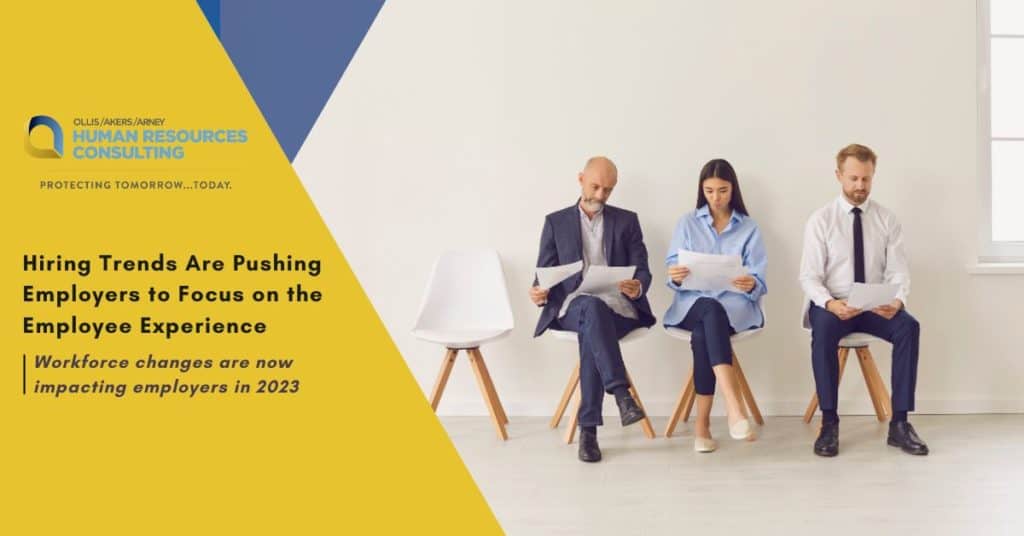Employers have been forced to navigate and respond to several challenges over the last few years, including the COVID-19 pandemic, a tight labor market, rising health care costs, inflation and a potential recession. These challenges have pushed many organizations and their employees to their limits. According to a recent survey from management consulting firm McKinsey, more than half of business leaders say their organizations are not prepared for future economic and geopolitical challenges.
Workforce changes are now impacting employers in 2023. Organizations are posting fewer job openings, extending fewer offers and prioritizing best-quality hires. As a result, employers are shifting from prioritizing growth to focusing on hiring key talent. However, many organizations have failed to find effective ways to support employees’ long-term health, well-being and growth, potentially undermining their efforts to attract and retain top talent. This article explores how current hiring trends are forcing employers to redefine the employee experience in order to improve hiring outcomes and attraction and retention.
Current Hiring Trends
A recent study from enterprise management cloud company Workday found a 10% decline in open roles in the first quarter of 2023 and a 4% decline in job offers compared to the same time last year, even though the number of applicants has remained relatively the same. This is the first time since 2020 that requisition growth has declined. This trend is especially pronounced among tech and media organizations, where job seekers are expected to compete with approximately 27 candidates for each opening. This number marks a 248% increase from the first quarter of 2022.
These statistics likely indicate the end of the growth era as employers shift their attention to efficiency over growth. Economic and market factors are pushing organizations to increasingly prioritize hiring the right candidates for each new position and internal productivity, leading to fewer open positions and job offers. As a result, ensuring a positive employee experience is becoming more important to help employers improve employee engagement, productivity and retention.
Strategies to Improve Employee Experience
As employers shift from growth to efficiency, a positive employee experience is essential to improve hiring outcomes, attraction and retention efforts and productivity. Understanding the current workplace dynamics and employee experience, including any challenges and opportunities, can help employers establish strategies to improve employee experience.
Focusing on Employee Engagement
The following are aspects employers can emphasize as they focus on employee engagement:
- Employee health and well-being—As employers increasingly prioritize efficiency over growth, employees will likely feel pressure to be more productive. This can increase the risk of employee burnout, especially since many employees are already under significant pressure to perform. Therefore, employers will need to find ways to improve employee efficiency without increasing burnout risk. Supporting workers’ health and well-being can help reduce this risk.
- Hybrid work—While the majority of employees feel productive in a hybrid environment, many employers find that hybrid or remote work makes it difficult to trust that employees are remaining productive outside of the office. Employers are more likely to improve the employee experience by focusing on outcomes rather than hours worked. Defining clear goals and objectives, as well as ways to effectively measure them, can enable employers to better prioritize employee work and cultivate an environment of trust, even in hybrid or remote environments. This can help reduce the risk of employee burnout and foster employee autonomy.
- Growth and recognition—With a heightened emphasis on existing employees rather than new hires for growth and innovation, employees must provide talented workers and high performers with recognition and ample growth opportunities. Providing internal mobility opportunities can boost employee engagement and retention. It can also increase workforce productivity and efficiency by ensuring employees are in the right positions for their skill sets. Employers can further ensure this by mapping skills and capabilities across their organizations.
- Organizational strategy—As internal and external pressures shift, creating clear strategic goals can help employees prioritize their work in accordance with high-value initiatives. This can allow employees to stay focused and improve engagement by utilizing their skills and providing a sense of purpose.
Leveraging Technology
As employers increasingly focus on employee experience to further organizational growth and innovation, leveraging new technology, such as artificial intelligence (AI) and machine learning (ML), can help create additional growth opportunities. Incorporating AI and ML technologies can help organizations run more efficiently by automating and streamlining manual, error-prone tasks, allowing employees to attend to high-value work. Employers that offer technology and other tools to support their workforce can help improve the employee experience by increasing job satisfaction. This can also help organizations to grow efficiently and economically. However, employers should familiarize themselves with the functionality and limitations of AI and ML technologies. Being aware of the limitations can allow organizations to evaluate and determine how best to use these technologies.
Employer Takeaway
As organizations adjust to the end of growth-based hiring, prioritizing workplace efficiency and employee experience is essential. Employers can do this by supporting employee health, well-being and productivity and leveraging technology. By considering employee needs, employers can focus on areas of improvement and increase workforce engagement.
For more workplace resources, contact Ollis/Akers/Arney Human Resources Consulting today.
This HR Insights is not intended to be exhaustive nor should any discussion or opinions be construed as professional advice. © 2023 Zywave, Inc. All rights reserved.

